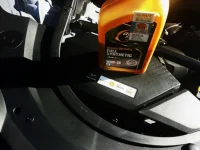Mark_888
Registered Member
- Joined
- Jan 9, 2009
- Messages
- 13,335
- Reaction score
- 224
- Points
- 63
- Genesis Model Type
- 1G Genesis Sedan (2009-2014)
I completely agree and would go so far as to say that I can't recommend conventional motor oil (instead of synthetic) at any change interval, even 3000 miles. The cost of synthetic oil is just not expensive enough to justify having to use conventional motor oil. A 5-quart jug of a high quality synthetic such as Mobil 1 costs about $23 at Walmart (recently lowered from $25). The Walmart house brand synthetic (about $17.50 per 5-quart jug) is much better than conventional. Even Toyota and Honda have switched over to requiring synthetic for almost all engines (although they do a sneaky way by requiring 0W-20 oil, which is only available as a synthetic).I would categorize it as moderate/sever. I'm fortunate to be able to adjust my hours to avoid most of the stop and go rush hour, those that can't it is sever. June-Aug you are going to sever temperature, and we have dust. Summer months, regular oil, 3750 would not be a bad call. When it cools down, you could go to 5-6000. I just can't come to recommend 7500 on regular oil, it's cheap and engines are expensive. But I'm old school.
Edit to add: I have done well with synthetic at a 5000 mile interval, year round. For the most part, my car fully warms up to temperature for about 30 minutes, that is really important as that give the contaminants a chance to "cook-off".
But my main point was that if using a good quality synthetic, and if one only drives in severe conditions 25% of the time or less for one or two categories, then 7,500 miles between oil changes is perfectly fine. The point is that the severe service test does not apply if one "ever" has driven in those circumstances, but only if one drives in one or more of those severe conditions at least 50% of the time. Plus, they were written for conventional oil, which is all that is required by Hyundai.










